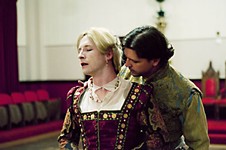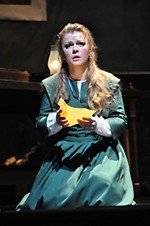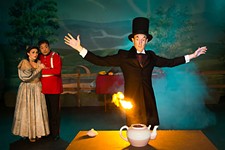Method to Their Madness
Two leading ladies reflect on their psychotic characters' unique relationships with the score
By Adam Roberts, Fri., Jan. 27, 2012
To begin with, the "method" in this feature's title? That's a method, not the Method. For a performer to wrestle with a character's psychological pathologies through the approaches prescribed by Method acting would probably not be the wisest of actions. This isn't to say that Austin actress Meredith McCall and Russian soprano Lyubov Petrova haven't given careful thought to the mental illnesses that plague their characters, however. On the contrary, the pair – who open this weekend as Diana in Zach Theatre's Next to Normal and Lucia in Austin Lyric Opera's Lucia di Lammermoor, respectively – have devoted significant watts of brainpower to considering the ways in which musical situations rendezvous to inform their characters.
The women portrayed by Petrova and McCall are linked by psychosis. Lucia's third act features what is likely the most famous "mad scene" in all of opera, with the title character murdering the man she married just minutes before, then returning, blood-soaked with knife in hand, to her own wedding reception. The modern-day Diana of the 2008 musical Next to Normal subsists on nearly every psychiatric drug imaginable and attempts suicide after making the decision to flush her entire supply down the toilet once and for all. Her doctor intervenes this time with electroconvulsive therapy, which results in the loss of some of Diana's most treasured memories.
Though these two characters are united by psychiatric crises and a penchant for apparitions, their musical treatments are about as far afield from each other as one could conceive. After all, Donizetti's Lucia debuted nearly 175 years before Brian Yorkey and Tom Kitt's Normal, and compositional practice has changed a lot over the intervening centuries. Even so, both Petrova and McCall point to similar aspects of their respective scores when asked for their vantage points on the composers' choices.
"When I first looked at the score, it was quite clear for me that both the story and the music have the whole character written in a way that is very fragile," Petrova observes. "For example, from number to number, Lucia is shown in completely different moods and states of mind. She is telling a scary story one moment about the ghost and the next is ecstatic about her lover. Then in the next scene, we see her as quite a strong woman in a fight with her brother, and in the next, completely collapsed and passive."
McCall describes how the similarly shifting terrain of her character's arc is supported by the evocation of diverse musical genres throughout the show: "I think there's something about the variety of musical styles that takes you on the journey of these manic, a little bit out-of-control moments and then these sort of flat moments and also these terribly sad moments. I find that the music most definitely takes the actor, and I think also the listener, on her ride – which is not what we would call a 'normal' ride."
Orchestrations also play a primary role in a performer's interpretation of the score. Like most opera orchestras, Lucia's ensemble is large. This contrasts dramatically with the chamber-sized ensemble of Next to Normal, which includes only seven instrumentalists. Though economic constraints factor heavily in the making of such decisions where musicals are concerned, even in Broadway pits, Normal orchestrator Michael Starobin is a master at making the most of each instrument he's been allotted – a trait lauded by McCall in discussing the show's palette of instrumental colors.
"I love that in spite of it being, perhaps, a pop-rock score, it also includes a cello and violin, which I find to be such beautiful instruments. To include them in the piece gives it a different feel, a different depth. There's a different place you go with a cello than you do with an electric guitar. There are a lot of really great acoustic songs, and I think that some of those places where it can be a little calmer, a little warmer, are really wonderful in contrast."
In Lucia, Donizetti originally wrote "Il dolce suono" ("The sweet sound," as Lucia's "mad" aria begins) to be accompanied by glass harmonica; that instrument is often replaced by flute in performance. For Petrova, the eerie give-and-take of voice and instrument in this case is significant in interpreting her character. "The mad scene's famous cadenza with the flute ... nobody else hears it," she says. "It's a fantastic way of expressing the madness. There are tons of people around, but Lucia is in her own world, and she hears music and voices that nobody else can.
"I find it interesting to play with the idea that some voices come to her, and some she creates," she continues. "I play the cadenza with the flute as a dialogue with the voices in her head. She's communicating with her lover first. Then it's a ghost – it's all changing very quickly."
McCall finds similar significance in a lone instrument where her own character is concerned, and like Lucia's, it is a sweet sound: that of a music box. "I think about the song 'I Dreamed a Dance,' which is this music box lullaby that takes you into a very specific place. In that particular scene, Diana is going someplace emotionally with her longing for her child – so it makes perfect sense that she encounters this music box, opens it, and then is taken to this other place. And I feel like that music takes me to that place very easily."
But for Diana, not every musical moment is as predictable and reassuring as a music box waltz. "I think that the composer and lyricist have found ways to use both unusual time signatures as well as shifting meters that indicate a certain erratic or uneven feel, so that it seems to mirror her emotional state at the time," says McCall. She points out, for example, that her song "Wish I Were Here," "which is really driving but then goes into 7/8, puts you in sort of an unusual feel – of course, at that point Diana is undergoing electroshock therapy, but that seems indicative of what's going on, where things are starting and stopping."
For all of the shaky psyche exposed through the music of both characters, though, one mustn't forget the invocation of those happier moments, like Diana's music box waltz or the ironically sweet sound of Lucia's musical setting in the depths of her trauma. "She's very faithful to her love, and very strong in her feelings," reminds Petrova. "That has stayed with her through the whole piece. Her loyalty is where she finds her strength. She kills because of her loyalty. The most interesting twist in the story is that only in that madness does she find her happiness. That strength and loyalty is still there. All she sees is her beloved. It amazes me."
Lucia di Lammermoor will be performed Saturday, Jan. 28, 7:30pm; Friday, Feb. 3, 7:30pm; and Sunday, Feb. 5, 3pm, in Dell Hall at the Long Center, 701 W. Riverside. For more information, visit www.austinlyricopera.org.
Next to Normal runs Jan. 25-March 4, Tuesday-Saturday, 8pm; Sunday, 2:30pm, on the Zach Theatre Kleberg Stage, 1421 W. Riverside. For more information, call 476-0541 or visit www.zachtheatre.org.













